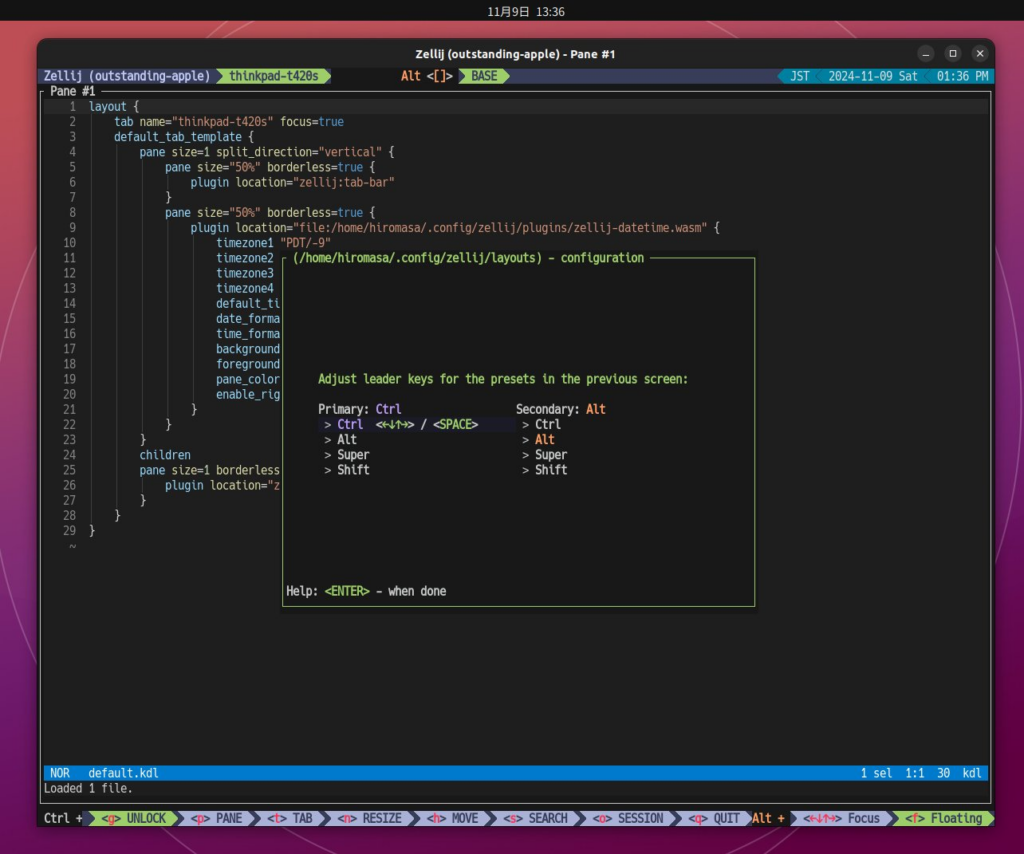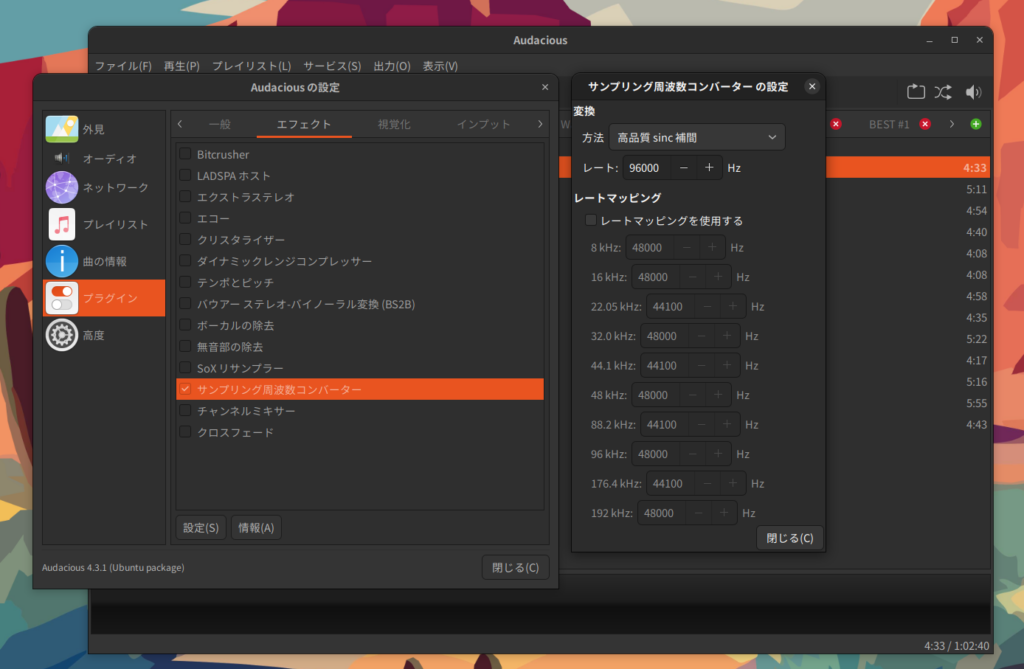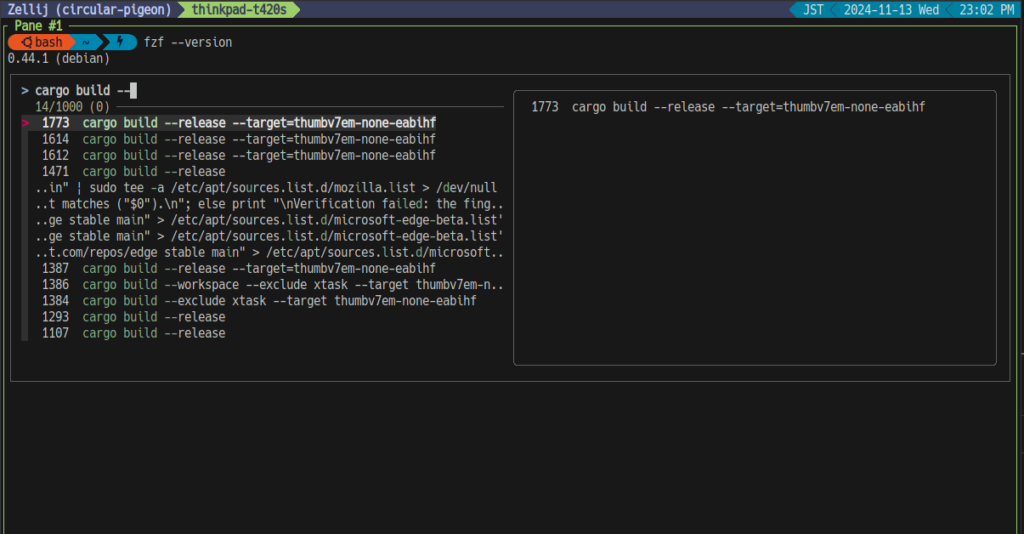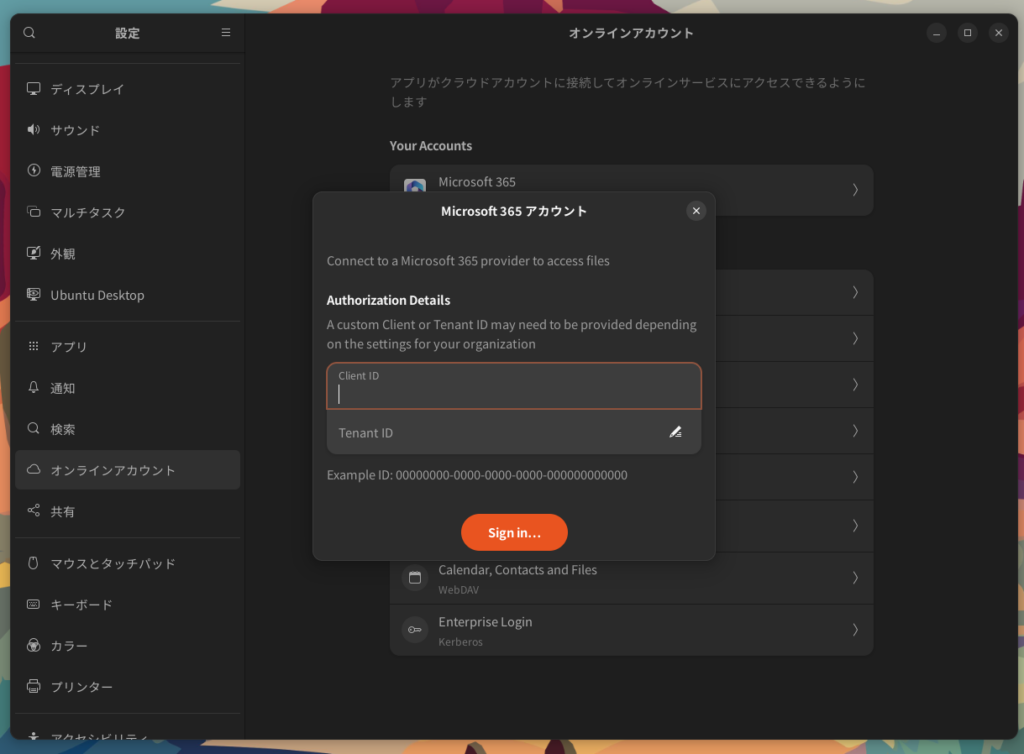Cranelift のコンパイラ基盤を使ったハローワールドメモ。
Cranelift is a low-level retargetable code generator. It translates a target-independent intermediate representation into executable machine code.
Wasmtime の JIT 基盤として使われているプロダクトで、Rust から Crainelift IR を構築して各 CPU マシン語コードにコンパイルして実行することができる。オリジナルのコンパイラ言語を作る時にも活用できそうです。
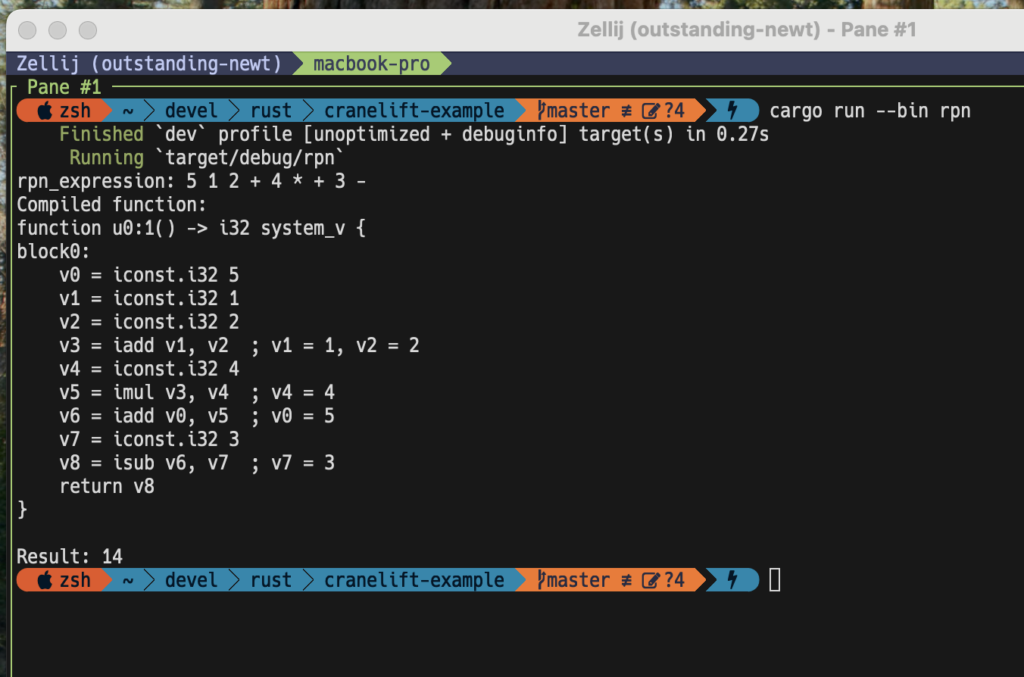
逆ポーランド記法をパースして JIT で計算させる
Cargo.toml
[package]
name = "cranelift-example"
version = "0.1.0"
edition = "2021"
[dependencies]
cranelift = "0.117.0"
cranelift-codegen = "0.117.0"
cranelift-frontend = "0.117.0"
cranelift-jit = "0.117.0"
cranelift-module = "0.117.0"
libc = "0.2"
bin/rpn.rs
use cranelift::codegen::ir::{types, AbiParam, Function, InstBuilder, Value};
use cranelift::frontend::{FunctionBuilder, FunctionBuilderContext};
use cranelift_codegen::ir::UserFuncName;
use cranelift_jit::{JITBuilder, JITModule};
use cranelift_module::Module;
use std::collections::VecDeque;
fn main() {
// RPN expression input
let rpn_expression = "5 1 2 + 4 * + 3 -";
// Create a JIT builder and module.
let jit_builder = JITBuilder::new(cranelift_module::default_libcall_names()).expect("Failed to create JITBuilder");
let mut module = JITModule::new(jit_builder);
// Create the main function signature.
let mut ctx = module.make_context();
let mut sig = module.make_signature();
sig.returns.push(AbiParam::new(types::I32));
let main_func = module.declare_function("main", cranelift_module::Linkage::Export, &sig).unwrap();
ctx.func = Function::with_name_signature(UserFuncName::user(0, 1), sig);
let mut builder_ctx = FunctionBuilderContext::new();
let mut builder = FunctionBuilder::new(&mut ctx.func, &mut builder_ctx);
// Create the entry block.
let entry_block = builder.create_block();
builder.switch_to_block(entry_block);
builder.seal_block(entry_block);
// Stack to hold values
let mut stack: Vec<Value> = Vec::new();
// Parse and evaluate the RPN expression
let tokens: VecDeque<&str> = rpn_expression.split_whitespace().collect();
for token in tokens {
match token {
"+" => {
let b = stack.pop().expect("Stack underflow");
let a = stack.pop().expect("Stack underflow");
let result = builder.ins().iadd(a, b);
stack.push(result);
}
"-" => {
let b = stack.pop().expect("Stack underflow");
let a = stack.pop().expect("Stack underflow");
let result = builder.ins().isub(a, b);
stack.push(result);
}
"*" => {
let b = stack.pop().expect("Stack underflow");
let a = stack.pop().expect("Stack underflow");
let result = builder.ins().imul(a, b);
stack.push(result);
}
"/" => {
let b = stack.pop().expect("Stack underflow");
let a = stack.pop().expect("Stack underflow");
let result = builder.ins().sdiv(a, b);
stack.push(result);
}
_ => {
let value: i32 = token.parse().expect("Invalid token");
let value = builder.ins().iconst(types::I32, value as i64);
stack.push(value);
}
}
}
// The final result should be the only value left on the stack
let result = stack.pop().expect("No result on stack");
builder.ins().return_(&[result]);
// Finalize the function.
builder.finalize();
println!("rpn_expression: {}", rpn_expression);
println!("Compiled function: ");
println!("{}", ctx.func.display());
// Compile and run the function.
module.define_function(main_func, &mut ctx).unwrap();
module.clear_context(&mut ctx);
module.finalize_definitions().expect("Failed to finalize definitions");
let code_ptr = module.get_finalized_function(main_func);
let code_fn = unsafe { std::mem::transmute::<_, fn() -> i32>(code_ptr) };
let result = code_fn();
println!("Result: {}", result); // Expected output: Result: 14
}
生成される Cranelift IR と実行ログ:
$ cargo run --bin rpn
Compiling cranelift-example v0.1.0 (/Users/hk2a/devel/rust/cranelift-example)
Finished `dev` profile [unoptimized + debuginfo] target(s) in 1.20s
Running `target/debug/rpn`
rpn_expression: 5 1 2 + 4 * + 3 -
Compiled function:
function u0:1() -> i32 system_v {
block0:
v0 = iconst.i32 5
v1 = iconst.i32 1
v2 = iconst.i32 2
v3 = iadd v1, v2 ; v1 = 1, v2 = 2
v4 = iconst.i32 4
v5 = imul v3, v4 ; v4 = 4
v6 = iadd v0, v5 ; v0 = 5
v7 = iconst.i32 3
v8 = isub v6, v7 ; v7 = 3
return v8
}
Result: 14
逆ポーランド記法をパースして JIT で計算させる(スタックスロット)
bin/rpn.rs
use cranelift::codegen::ir::{types, AbiParam, Function, InstBuilder, StackSlot, StackSlotData, StackSlotKind, Value};
use cranelift::frontend::{FunctionBuilder, FunctionBuilderContext};
use cranelift_codegen::ir::UserFuncName;
use cranelift_jit::{JITBuilder, JITModule};
use cranelift_module::Module;
use std::collections::VecDeque;
fn main() {
// RPN expression input
let rpn_expression = "5 1 2 + 4 * + 3 -";
// Create a JIT builder and module.
let jit_builder = JITBuilder::new(cranelift_module::default_libcall_names()).expect("Failed to create JITBuilder");
let mut module = JITModule::new(jit_builder);
// Create the main function signature.
let mut ctx = module.make_context();
let mut sig = module.make_signature();
sig.returns.push(AbiParam::new(types::I32));
let main_func = module.declare_function("main", cranelift_module::Linkage::Export, &sig).unwrap();
ctx.func = Function::with_name_signature(UserFuncName::user(0, 1), sig);
let mut builder_ctx = FunctionBuilderContext::new();
let mut builder = FunctionBuilder::new(&mut ctx.func, &mut builder_ctx);
// Create the entry block.
let entry_block = builder.create_block();
builder.switch_to_block(entry_block);
builder.seal_block(entry_block);
// Stack slot to hold values
let stack_slot = builder.create_sized_stack_slot(StackSlotData::new(StackSlotKind::ExplicitSlot, 16, 0));
let mut offset = 0;
// Parse and evaluate the RPN expression
let tokens: VecDeque<&str> = rpn_expression.split_whitespace().collect();
for token in tokens {
match token {
"+" => {
let b = pop(&mut builder, stack_slot, &mut offset);
let a = pop(&mut builder, stack_slot, &mut offset);
let result = builder.ins().iadd(a, b);
push(&mut builder, stack_slot, &mut offset, result);
}
"-" => {
let b = pop(&mut builder, stack_slot, &mut offset);
let a = pop(&mut builder, stack_slot, &mut offset);
let result = builder.ins().isub(a, b);
push(&mut builder, stack_slot, &mut offset, result);
}
"*" => {
let b = pop(&mut builder, stack_slot, &mut offset);
let a = pop(&mut builder, stack_slot, &mut offset);
let result = builder.ins().imul(a, b);
push(&mut builder, stack_slot, &mut offset, result);
}
"/" => {
let b = pop(&mut builder, stack_slot, &mut offset);
let a = pop(&mut builder, stack_slot, &mut offset);
let result = builder.ins().sdiv(a, b);
push(&mut builder, stack_slot, &mut offset, result);
}
_ => {
let value: i32 = token.parse().expect("Invalid token");
let value = builder.ins().iconst(types::I32, value as i64);
push(&mut builder, stack_slot, &mut offset, value);
}
}
}
// The final result should be the only value left on the stack
let result = pop(&mut builder, stack_slot, &mut offset);
builder.ins().return_(&[result]);
// Finalize the function.
builder.finalize();
println!("rpn_expression: {}", rpn_expression);
println!("Compiled function: ");
println!("{}", ctx.func.display());
// Compile and run the function.
module.define_function(main_func, &mut ctx).unwrap();
module.clear_context(&mut ctx);
module.finalize_definitions().expect("Failed to finalize definitions");
let code_ptr = module.get_finalized_function(main_func);
let code_fn = unsafe { std::mem::transmute::<_, fn() -> i32>(code_ptr) };
let result = code_fn();
println!("Result: {}", result); // Expected output: Result: 14
}
// Helper functions for stack operations
fn push(builder: &mut FunctionBuilder, stack_slot: StackSlot, offset: &mut i32, value: Value) {
builder.ins().stack_store(value, stack_slot, *offset);
*offset += 4;
}
fn pop(builder: &mut FunctionBuilder, stack_slot: StackSlot, offset: &mut i32) -> Value {
*offset -= 4;
builder.ins().stack_load(types::I32, stack_slot, *offset)
}
生成される Cranelift IR と実行ログ:
$ cargo run --bin rpn
Compiling cranelift-example v0.1.0 (/Users/hk2a/devel/rust/cranelift-example)
Finished `dev` profile [unoptimized + debuginfo] target(s) in 0.74s
Running `target/debug/rpn`
rpn_expression: 5 1 2 + 4 * + 3 -
Compiled function:
function u0:1() -> i32 system_v {
ss0 = explicit_slot 16
block0:
v0 = iconst.i32 5
stack_store v0, ss0 ; v0 = 5
v1 = iconst.i32 1
stack_store v1, ss0+4 ; v1 = 1
v2 = iconst.i32 2
stack_store v2, ss0+8 ; v2 = 2
v3 = stack_load.i32 ss0+8
v4 = stack_load.i32 ss0+4
v5 = iadd v4, v3
stack_store v5, ss0+4
v6 = iconst.i32 4
stack_store v6, ss0+8 ; v6 = 4
v7 = stack_load.i32 ss0+8
v8 = stack_load.i32 ss0+4
v9 = imul v8, v7
stack_store v9, ss0+4
v10 = stack_load.i32 ss0+4
v11 = stack_load.i32 ss0
v12 = iadd v11, v10
stack_store v12, ss0
v13 = iconst.i32 3
stack_store v13, ss0+4 ; v13 = 3
v14 = stack_load.i32 ss0+4
v15 = stack_load.i32 ss0
v16 = isub v15, v14
stack_store v16, ss0
v17 = stack_load.i32 ss0
return v17
}
Result: 14
システムコールする例
libc の printf をコールして Hello, World を出力。
bin/hello.rs
use cranelift::codegen::ir::{types, AbiParam, Function, InstBuilder};
use cranelift::frontend::{FunctionBuilder, FunctionBuilderContext};
use cranelift_codegen::ir::UserFuncName;
use cranelift_jit::{JITBuilder, JITModule};
use std::ffi::CString;
use cranelift_module::{Module, Linkage};
use libc;
fn main() {
// Create a JIT builder and module.
let mut jit_builder = JITBuilder::new(cranelift_module::default_libcall_names()).expect("Failed to create JITBuilder");
jit_builder.symbol("printf", printf as *const u8);
let mut module = JITModule::new(jit_builder);
// Create a function signature for `printf`.
let mut ctx = module.make_context();
let mut sig = module.make_signature();
let pointer_type = module.target_config().pointer_type();
sig.params.push(AbiParam::new(pointer_type)); // フォーマット文字列の引数
sig.params.push(AbiParam::new(pointer_type)); // 可変引数のためのダミー引数
sig.returns.push(AbiParam::new(types::I32));
let printf = module.declare_function("printf", Linkage::Import, &sig).unwrap();
// Create the main function signature.
let mut sig = module.make_signature();
sig.returns.push(AbiParam::new(types::I32));
let main_func = module.declare_function("main", Linkage::Export, &sig).unwrap();
ctx.func = Function::with_name_signature(UserFuncName::user(0, 1), sig);
let mut builder_ctx = FunctionBuilderContext::new();
let mut builder = FunctionBuilder::new(&mut ctx.func, &mut builder_ctx);
// Create the entry block.
let entry_block = builder.create_block();
builder.append_block_params_for_function_params(entry_block);
builder.switch_to_block(entry_block);
builder.seal_block(entry_block);
// Create the string data.
let hello_world = CString::new("Hello, World!\n").unwrap();
let hello_world_ptr = hello_world.as_ptr() as i64;
// Call the `printf` function.
let printf_func = module.declare_func_in_func(printf, builder.func);
let format_str = builder.ins().iconst(types::I64, hello_world_ptr);
let zero = builder.ins().iconst(types::I64, 0);
let call = builder.ins().call(printf_func, &[format_str, zero]);
// Return the result of the call.
let result = builder.inst_results(call)[0];
builder.ins().return_(&[result]);
builder.finalize();
println!("{}", ctx.func.display());
// Compile and run the function.
module.define_function(main_func, &mut ctx).unwrap();
module.clear_context(&mut ctx);
module.finalize_definitions().expect("Failed to finalize definitions");
let code_ptr = module.get_finalized_function(main_func);
let code_fn = unsafe { std::mem::transmute::<_, fn() -> i32>(code_ptr) };
code_fn();
}
// Dummy printf function to link with.
extern "C" fn printf(fmt: *const i8, _dummy: i64) -> i32 {
unsafe {
libc::printf(fmt)
}
}
生成される Cranelift IR と実行ログ:
$ cargo run --bin hello
Finished `dev` profile [unoptimized + debuginfo] target(s) in 0.47s
Running `target/debug/hello`
function u0:1() -> i32 system_v {
sig0 = (i64, i64) -> i32 system_v
fn0 = u0:0 sig0
block0:
v0 = iconst.i64 0x6000_0258_0180
v1 = iconst.i64 0
v2 = call fn0(v0, v1) ; v0 = 0x6000_0258_0180, v1 = 0
return v2
}
Hello, World!
